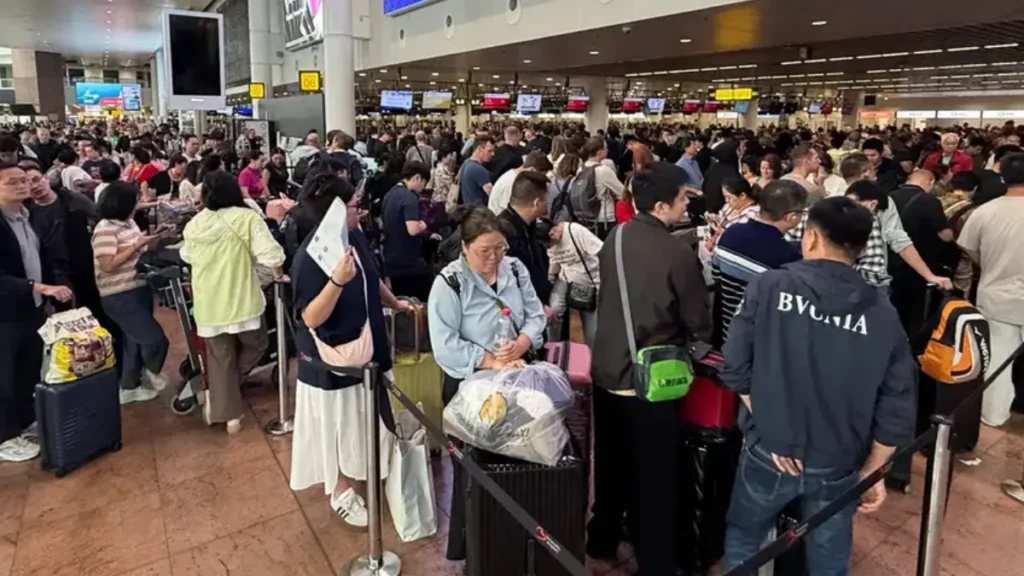Cyber attack European airports has thrown air travel into disarray across multiple European cities, forcing airlines to cancel flights, delay schedules, and return to manual check-in methods. Major hubs such as Brussels, London Heathrow, and Berlin Brandenburg reported heavy disruptions after a cyber-related incident targeted systems used for check-in and baggage services.
Large-Scale Disruption Across Major Airports
The trouble began late on Friday night, September 19, when Collins Aerospace, a key aviation technology provider, experienced what it described as a “cyber-related disruption” in its MUSE software. This system powers check-in kiosks and baggage-drop counters at many airports across Europe.
By Saturday morning, Brussels Airport was among the hardest hit. Authorities there instructed airlines to cancel almost half of scheduled Sunday departures, citing the need to reduce congestion and maintain passenger safety. London Heathrow and Berlin Brandenburg also faced delays and cancellations, creating ripple effects across Europe’s aviation network.
Brussels Airport’s Official Update
In an official statement, Brussels Airport confirmed that the cyberattack against its service provider had “a large impact on the flight schedule.” Airport officials warned passengers that delays and cancellations were unavoidable and urged them to check flight details with airlines before heading to the terminal.
“The service provider is actively working on the issue and trying to resolve the problem as quickly as possible,” the airport said.
This advice came as departure halls filled with long queues of travelers waiting for manual check-in.
Flight Data Shows Extent of the Problem
According to aviation data company Cirium, at least 29 flights were canceled across Brussels, Berlin, and London Heathrow by Saturday afternoon. The scale of the disruption was far wider, with hundreds of departures facing significant delays.
- Heathrow Airport had 651 scheduled departures
- Brussels Airport had 228 departures planned
- Berlin Brandenburg Airport had 226 departures
The sudden switch to manual check-in meant operations slowed dramatically, leaving passengers frustrated and airlines struggling to manage the traffic flow.
| Airport | Planned Departures | Reported Cancellations | Current Measures |
|---|---|---|---|
| London Heathrow | 651 | Rising throughout day | Manual counters active |
| Brussels Airport | 228 | Dozens canceled; half of Sunday flights cut | Large delays, manual processes |
| Berlin Brandenburg | 226 | Several confirmed | Manual check-in and boarding |
Collins Aerospace Confirms Cyber Attack
Collins Aerospace, the U.S.-based company that operates the MUSE system, admitted that its software had been compromised. Speaking to AFP, the company acknowledged that the disruption had hit multiple European airports.
The firm emphasized that the issue was confined to electronic check-in and baggage systems, adding:
“The impact is limited to electronic customer check-in and baggage drop and can be mitigated with manual check-in operations.”
Although the company did not disclose the source of the cyberattack, experts suggest that the aviation sector’s dependence on third-party software makes it particularly vulnerable.
Chaos for Passengers
Travelers across affected airports described confusion and long waits. Automated kiosks were down, baggage-drop machines were unavailable, and queues at manual counters stretched across terminals.
Some passengers missed connecting flights due to the delays, while others reported waiting several hours just to check in. Airlines quickly issued advisories, asking travelers to arrive earlier than usual and to confirm their bookings online before reaching the airport.
Growing Cybersecurity Concerns
The cyber attack European airports incident underscores growing concerns about cybersecurity in aviation. Airports and airlines rely heavily on automated systems for efficiency, but this dependence creates risks. A single disruption in one provider’s software can spread across borders, crippling travel for thousands.
Industry experts warn that investment in stronger cybersecurity defenses is now urgent. The aviation industry, already strained by staffing shortages and high passenger demand, must prepare for future digital threats to safeguard critical infrastructure.
Ongoing Recovery Efforts
Authorities confirmed that flights were still operating but at a reduced pace through manual systems. Collins Aerospace engineers continue to work with airport teams to restore the MUSE software.
Brussels Airport has already announced widespread cancellations for Sunday, while other airports are warning of continued delays until the issue is fully resolved. Passengers are strongly advised to monitor airline updates, arrive early, and plan for possible disruptions.
Also read: Indian Wildlife: A Complete Guide to Nature’s Treasures
Conclusion
Though the cyberattack is being addressed, its aftereffects are expected to linger for days. Airlines will need time to clear backlogs, and passengers should remain prepared for changes to their travel schedules.
The event highlights a hard truth for global aviation: in a highly digitalized world, cyberattacks have the power to ground flights, overwhelm terminals, and disrupt international travel within hours. Strengthening cybersecurity has now become as vital to aviation safety as runway maintenance or air traffic control.

